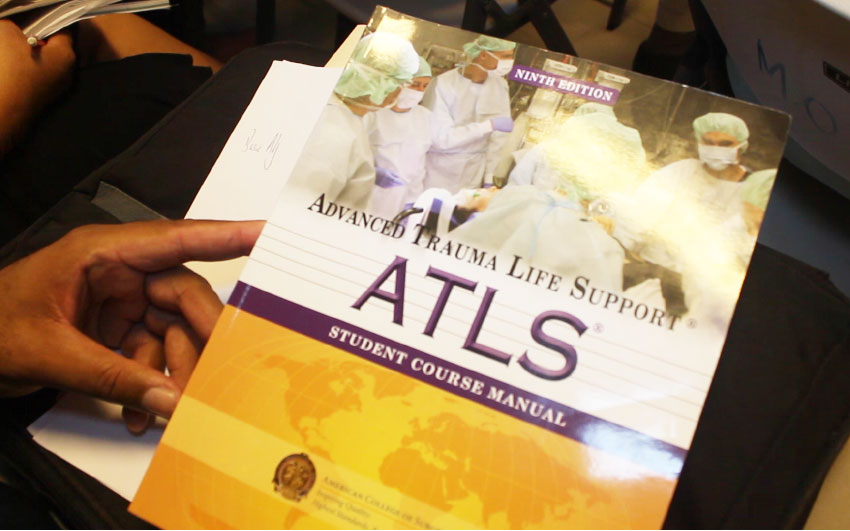PRESS RELEASE – WITH increasing levels of trauma due to traffic accidents, stabbings, shootings and the like, doctors and nurses of the Accident and Emergency Department at the Victoria Hospital last week participated in a two-day Advanced Trauma Life Support (ATLS) training course. The course was facilitated by Ryder Trauma Center/University of Miami.
The Victoria Hospital sees the majority of trauma cases on island. With an uptake in trauma cases in the last four years, the Accident and Emergency Department (A&E) has moved more aggressively to a protocol-driven, systematic approach to the trauma patient.

Head of A&E, Dr. Lisa Charles, said it is vital that across the board doctors and nurses have an approach to trauma which ensures they do not miss major injuries. She fully endorsed the two-day Advanced Trauma Life Support (ATLS) course coordinated by the Ryder Trauma Centre in Miami.
“The training in trauma life support is applicable to any trauma patient in any hospital. In fact, the trauma course itself is designed for hospital where immediate care by surgeons is not available on occasion. So it gives, for instance, the ER Physician the capabilities to manage and stabilize the patient over a period of time before we can get the patient to definitive care. So it’s applicable everywhere.
“Certainly, at Victoria Hospital we have access to surgeons but in the middle of the night sometimes you have ER Physicians who are on their own and it’s really important that they have the practical skills and the knowledge to know what to do in that first half hour in terms of stabilizing the trauma patient, recognizing life-threatening injuries and intervening appropriately.”
Holders of the ATLS certification must do a refresher course every four years in order to retain this certification. The Ryder Treatment Centre will also assist the Victoria Hospital to initiate a trauma alert system, develop trauma treatment guidelines and a trauma data registry.
One of the facilitators, Dr. Daniel Pust, stated that trauma is the most common cause of death among children to adults aged forty. However, the course focuses on more than just trauma care.
“But (it also focuses) on important community outreach programmes in order to teach certain safety efforts like wearing a seat belt when you operate your motor vehicle, violence prevention programmes to reduce the amount of gunshot wound victims and stab wound victims. So community outreach programmes are a very important step. Also, child safety and child safety seats in motor vehicles are very important to prevent trauma. So a big aspect of this initiative is also prevention of injury and trauma,” Dr. Pust said.
Course Director for the (ATLS) programme in Miami, Dr. George Garcia, provided further insight into the programme.
“The course is sponsored by the American College of Surgeons Committee on Trauma. It is currently taught in over 60 countries and we are extremely proud and grateful to add St. Lucia to that list. The most recent statistics is there are over a million providers worldwide training in ATLS,” explained Dr. Garcia.
There were 20 participants in this first round of training conducted under the umbrella of the St. Lucia Heart Lung and Blood Foundation. Participants included general surgeons and ER Physicians, nurses from ER and the operating theatre, Anesthesiologist and Junior ER Physicians.





![Simón Bolívar - Liberator of the Americas [Photo credit: Venezuelan Embassy]](https://thevoiceslu.com/wp-content/uploads/2025/12/Simon-Bolivar-feat-2-380x250.jpg)



